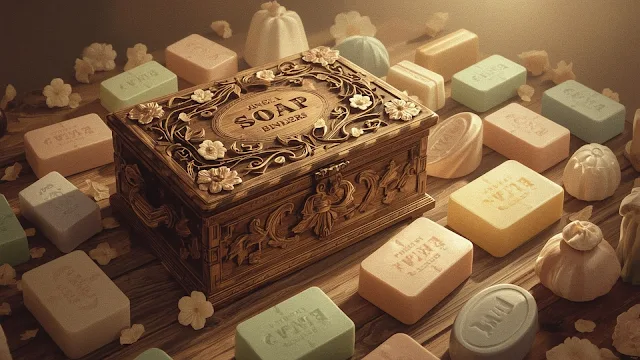Soaping the Future: Deep Dive into the Soap Sphere
 |
Homemade Soap |
Introduction:
1. Why does Soap Still Matter to talk about?
Soap is not something hygienic alone; it's a necessity in everyday life. The demand is very high in the market; consumers are interested in environmentally friendly, artisanal bars with natural ingredients. This means the long-term interest in the market and a high-quality, trustworthy business landing will create more click-through potential income.
2. The Soap Industry Anatomy
- Universality & niche markets
- Eco-friendly bars—vegan, palm oil-free, and organic—are the latest thing.
- Practical soaps: Enriched with natural products (e.g., turmeric, charcoal, oatmeal).
- Luxury & gift soaps: Presented in a pretty way, usually as a gift
 |
SOAP GIFT BOX |
Structure of the Soap Industry
- Raw ingredients: coconut, olive, and palm oils; butter; lye; and additives.
- Manufacturing covers artisan workshops to factories
- Regulation: Depends on the ICAO regulations on safety, labels, and packaging.
4. Market Trends Opportunities
Do-it-yourself demand: The demand is such that people desire natural, customizable soaps and also like the process. Recurrent services: Boxed artisanal soaps that are delivered monthly, with high retention. Local markets/stores: Farmers markets, far from dead, help farmers make face-to-face sales.
The web world: Etsy, Instagram, and personal websites are sales-driven.
3. Who works in soap making?
 |
Soap Industry |
b) Production plant/laboratory staff employ huge-capacity mixers, molding equipment, and protective outfits. Manage quality tests, testing (pH, stability), and compliance.
c) Supply chain/logistics: farmers, coop producers, sourcing of raw material. Distribution: wholesale, retail, and e-commerce fulfillment.
5. Economic Appeal
Low entry barriers: The investment for setup costs is around 10,000 and 20,000 (materials, molds, safety gear). Scalable: Start small again, ramping up inventory as demand goes up.
High profit margins: Gross profit margins can reach 60-80% on handmade special soap bars.
6. Obstacles to Deal With
Regulatory demands: Claims, in particular, especially for those of organic and antibacterial nature, as well as allergens.
Competition: There are a lot of craftspeople who require branding or niche variations and advertise their products, and some of them make it possible; they sell the products directly to online platforms. and create a broadcast that the easy drive them to potentially sell their products.
Consistency: "Small disciplines repeated with consistency every day lead to great achievements gained slowly over time." It involves careful testing and measuring of quality.
7. SEO opportunities/Content opportunities
.jpeg) |
Online Market |
Practical information: step-by-step instructions, product features, and hot natural ingredients—always look for upgrades and try to make high-quality customers. Knowing the market is always essential.
Evergreen posts: Safety in soap making / Ideas in packaging gifting soaps/scents of soap by skin types.
Soap Making at Home
1. Safety Essentials
- Labor in a ventilated place.
- Wear long sleeves, goggles, and gloves.
- Be careful with lye (sodium hydroxide): it is caustic.
2. Items Used & Ingredients
- Lye NaOH (sodium hydroxide).
- Oils/fats: coconut, olive, shea, palm (unrefined).
- Colorants, including mica and clays, essential oils, and botanicals: colorants (clays and mica) and botanicals.
- Equipment: a scale, a thermometer, a stainless pot, a stick blender, molds, and a spatula.
3. Cold-Process Method

Natural small business idea: Homemade soap Bar
- Weigh oils and lye—it must be done accurately.
- Dissolve lye: Add cool water to the lye; wait until ~38°C.
- High-viscosity oils: melted and mixed to ~38°C.
- Mix & incorporate: gradually add lye to oils and cream until traces (that resemble pudding) appear.
- Add extras: Add perfumes, coloring agents, and botanicals.
- Casting and setting: Cast in molds and allow to set for 24-48 hours.
- Cure: remove and cure in rack 4 to 6 weeks to make hard.

Natural small business idea: Homemade soap Bar
4. A Few Hints on How to Win
An online lye calculator is available to work out special recipes. cured Test pH (910 or less). Try swirling as a method of aesthetics. Cure dry in a cool place to retain moisture at a low level. Top Home-Based Business Ideas of Business in Soap
What is the most profitable small company?
Production of handmade artisan products is quite profitable in most places, and soaps are no exception because of their high prices and cult following.
What is the least expensive business to candid?
Starting a soap business does not require a high investment, as studies say you can begin the project with 5k or 6k rupees worth of raw materials, safety equipment, and basic molds. To mold the structure, the entry point is perfect even for a novice.
What is the amount of rupees for starting a business?
You will be able to purchase raw materials, simple molds, wrapping and protection materials, and basic protective gear with 10,000-20,000 rupees, which is sufficient to release small quantities and make experiments with the market.
The majority of popular homemade soap
.jpeg) |
Budget packing |
Small Business Topic Tagline List (SEO Boost)
Examples of small businesses: artisan soap makers, craftspeople, and wellness products. Home-based small business ideas: loss leaders, soaps, seasonal theme soaps, and sample/trial boxes. How to start a low-cost, Eco-friendly business: Use low-cost molds (for example, silicone ice trays), biodegradable packaging, and homemade marketing.
Final Thoughts
Which niche is successful most of the time? Eco-friendly/luxury handmade bars—excellent demand, high margin. Most economical to begin with? Soap making—10K investments, open skills. Ideas for small businesses? Vegan soaps, soaps for fun children, herbal-based therapeutic bars, and spa lines. What do you require? Curiosity, shelf-testing, branding, and safety-first thinking. The highly organized format, including detailed text contents, user guides, and SEO-related titles, should expose users to the structure, retain their attention, and create AdSense income. Contact me when you need some help with keyword research, packaging mockups, or marketing strategy tips!









0 Comments